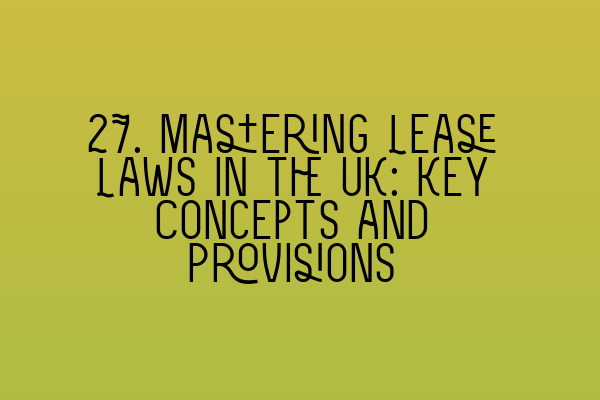Mastering Lease Laws in the UK: Key Concepts and Provisions
Lease laws in the UK can be complex and confusing, but with a clear understanding of the key concepts and provisions, you can navigate this area with confidence. In this blog post, we will explore the fundamental aspects of lease laws, shedding light on crucial terms and regulations that every property owner, tenant, and solicitor should know.
What is a Lease?
A lease is a legal agreement between a landlord (the property owner) and a tenant (the occupier) that grants the tenant the right to use and occupy the property for a specified period of time. It outlines the rights and responsibilities of both parties and sets out the terms and conditions of the tenancy.
Leases can cover a wide range of properties, including residential homes, commercial buildings, and even vacant land. They are commonly used in the UK’s property market and play a crucial role in regulating the relationship between landlords and tenants.
Key Concepts in Lease Laws
Understanding the key concepts in lease laws is essential for anyone involved in property transactions. Let’s delve into the fundamental terms and provisions:
1. Lease Term
The lease term refers to the duration for which the tenant has the right to occupy the property. It is usually specified in years, months, or weeks. It is crucial to clearly define the lease term to avoid any misunderstandings or disputes in the future.
If you are a property owner, it’s important to consider the long-term objectives for your property when determining the lease term. For tenants, understanding the term enables them to plan and make necessary arrangements accordingly.
2. Rent and Rent Reviews
The rent is the financial consideration paid by the tenant to the landlord in exchange for the right to occupy the property. It is typically paid periodically, such as monthly or quarterly, and the amount may be subject to review during the lease term.
Rent reviews allow the landlord to adjust the rent periodically to reflect current market conditions. It is essential to include provisions for rent reviews in the lease agreement to ensure fair and reasonable adjustments. Consulting an experienced solicitor can help you navigate the intricacies of rent reviews.
3. Repair and Maintenance
The lease agreement will outline the respective responsibilities of the landlord and tenant regarding repair and maintenance of the property. Generally, landlords are responsible for maintaining the structural elements of the property, while tenants are responsible for keeping the premises in good condition and carrying out day-to-day repairs.
It’s crucial for both parties to clearly understand their obligations to avoid disputes and ensure the property remains in a safe and habitable condition throughout the tenancy.
4. Termination and Renewal
Lease agreements come to an end at the expiry of the lease term. However, there are usually provisions for termination and renewal outlined in the agreement.
If you are a tenant, understanding these provisions will enable you to plan ahead and explore options for renewal or relocation. As a landlord, ensuring these provisions are clear and in compliance with current lease laws will provide you with flexibility and legal protection.
Seek Expert Advice to Navigate Lease Laws
Lease laws in the UK are intricate, and it can be overwhelming to decipher the legal jargon and complex provisions on your own. Seeking advice from experienced solicitors who specialize in property law is crucial in ensuring your rights and obligations are protected.
At SQE Property Law & Land Law, our team of expert solicitors is well-versed in lease laws and can provide you with the guidance and assistance you need. Whether you are a landlord or a tenant, our solicitors can help you draft and negotiate lease agreements, resolve disputes, and ensure compliance with relevant regulations.
For those looking to pursue a career in property law, it is crucial to have a comprehensive understanding of lease laws. Preparing for the SQE exams? Check out our related articles for practice exam questions and preparation courses:
- SQE 1 Practice Exam Questions
- SQE 1 Practice Mocks FLK1 FLK2
- SQE 2 Preparation Courses
- SQE 1 Preparation Courses
- SRA SQE Exam Dates
Mastering lease laws is a valuable skill for both property owners and tenants. By having a clear understanding of the key concepts and provisions, you can navigate the complexities of lease agreements with confidence and peace of mind.
Consulting a reputable solicitor like SQE Property Law & Land Law is always advisable to ensure your lease agreements are legally sound, fair, and tailored to your specific circumstances. Reach out to us today for expert advice and guidance!
